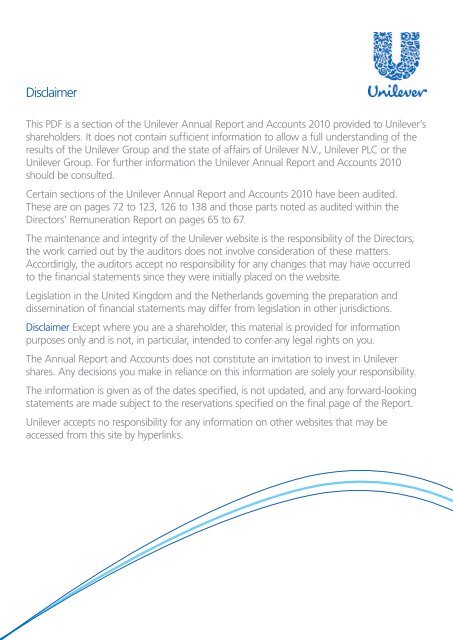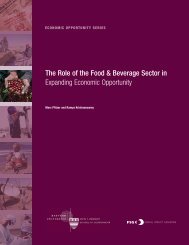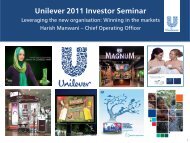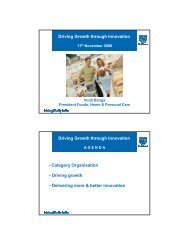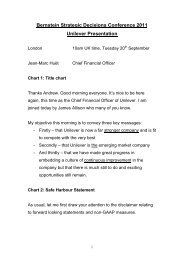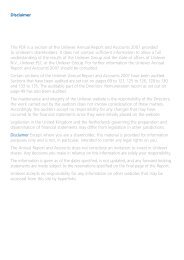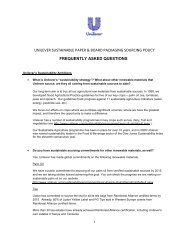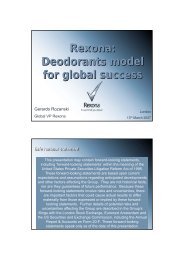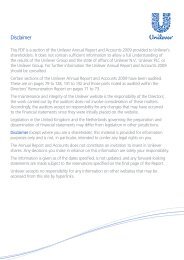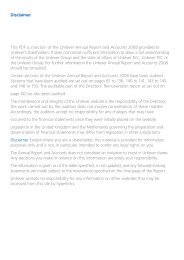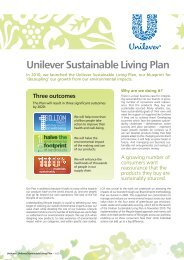Annual Report & Accounts 2010: Outlook and risks - Unilever
Annual Report & Accounts 2010: Outlook and risks - Unilever
Annual Report & Accounts 2010: Outlook and risks - Unilever
You also want an ePaper? Increase the reach of your titles
YUMPU automatically turns print PDFs into web optimized ePapers that Google loves.
Disclaimer<br />
This PDF is a section of the <strong>Unilever</strong> <strong>Annual</strong> <strong>Report</strong> <strong>and</strong> <strong>Accounts</strong> <strong>2010</strong> provided to <strong>Unilever</strong>’s<br />
shareholders. It does not contain sufficient information to allow a full underst<strong>and</strong>ing of the<br />
results of the <strong>Unilever</strong> Group <strong>and</strong> the state of affairs of <strong>Unilever</strong> N.V., <strong>Unilever</strong> PLC or the<br />
<strong>Unilever</strong> Group. For further information the <strong>Unilever</strong> <strong>Annual</strong> <strong>Report</strong> <strong>and</strong> <strong>Accounts</strong> <strong>2010</strong><br />
should be consulted.<br />
Certain sections of the <strong>Unilever</strong> <strong>Annual</strong> <strong>Report</strong> <strong>and</strong> <strong>Accounts</strong> <strong>2010</strong> have been audited.<br />
These are on pages 72 to 123, 126 to 138 <strong>and</strong> those parts noted as audited within the<br />
Directors’ Remuneration <strong>Report</strong> on pages 65 to 67.<br />
The maintenance <strong>and</strong> integrity of the <strong>Unilever</strong> website is the responsibility of the Directors;<br />
the work carried out by the auditors does not involve consideration of these matters.<br />
Accordingly, the auditors accept no responsibility for any changes that may have occurred<br />
to the financial statements since they were initially placed on the website.<br />
Legislation in the United Kingdom <strong>and</strong> the Netherl<strong>and</strong>s governing the preparation <strong>and</strong><br />
dissemination of financial statements may differ from legislation in other jurisdictions.<br />
Disclaimer Except where you are a shareholder, this material is provided for information<br />
purposes only <strong>and</strong> is not, in particular, intended to confer any legal rights on you.<br />
The <strong>Annual</strong> <strong>Report</strong> <strong>and</strong> <strong>Accounts</strong> does not constitute an invitation to invest in <strong>Unilever</strong><br />
shares. Any decisions you make in reliance on this information are solely your responsibility.<br />
The information is given as of the dates specified, is not updated, <strong>and</strong> any forward-looking<br />
statements are made subject to the reservations specified on the final page of the <strong>Report</strong>.<br />
<strong>Unilever</strong> accepts no responsibility for any information on other websites that may be<br />
accessed from this site by hyperlinks.
<strong>Outlook</strong> <strong>and</strong> <strong>risks</strong><br />
The following discussion about outlook <strong>and</strong> risk management<br />
activities includes ‘forward-looking’ statements that involve risk<br />
<strong>and</strong> uncertainties. The actual results could differ materially from<br />
those projected. See the ‘Cautionary statement’ on the inside<br />
back cover.<br />
<strong>Outlook</strong><br />
Market conditions for our business were challenging in <strong>2010</strong> <strong>and</strong><br />
we do not anticipate this changing significantly in 2011.<br />
Economic pressures are expected to continue to weigh heavily on<br />
consumer spending, particularly in developed markets where the<br />
combined impact of austerity measures <strong>and</strong> high unemployment<br />
is likely to constrain disposable incomes. Emerging market growth<br />
should continue to be robust, although even here we expect to<br />
see a modest slowdown. The most difficult environment is likely<br />
to be in Western Europe, where higher taxes, lower public<br />
expenditure <strong>and</strong> potentially rising interest rates mean that, for the<br />
short term at least, growth will be limited. In these conditions,<br />
consumer confidence is not expected to rise significantly in the<br />
year ahead <strong>and</strong> the search for value by the consumer will<br />
continue unabated.<br />
A further source of volatility in the year ahead is the return of<br />
inflationary pressure, particularly in respect of key commodity<br />
costs. We anticipate significant commodity cost inflation for at<br />
least the first half of 2011. If current trends continue then this<br />
inflationary pressure will extend also into the second half <strong>and</strong><br />
beyond. In this environment we expect prices to rise, albeit at a<br />
lower rate than costs as competitors seek to protect market<br />
positions <strong>and</strong> offset higher commodity costs with savings<br />
elsewhere.<br />
<strong>Report</strong> of the Directors About <strong>Unilever</strong><br />
The competitive environment for our business is likely to remain<br />
intense in 2011. Our key competitors, both global <strong>and</strong> local, will<br />
be eager to rebuild market share in many of our markets <strong>and</strong><br />
categories, <strong>and</strong> will design their activity plans accordingly. We<br />
expect continued high levels of competitive challenge to our<br />
many category leadership positions. Some of this will be<br />
price-based, as in <strong>2010</strong>, but we also expect strong<br />
innovation-based competition backed by wide-ranging br<strong>and</strong><br />
support. With the improvements we have been making to our<br />
business we are well prepared for these challenges.<br />
Faced with these challenges we will continue to focus on our long<br />
term strategic priorities of driving volume growth ahead of our<br />
markets whilst providing a steady improvement in underlying<br />
operating margin <strong>and</strong> strong cash flow. We are well placed, with<br />
an impressive presence in emerging markets, more than 75% of<br />
our business in either category leadership or number two<br />
positions, a portfolio of strong br<strong>and</strong>s, an increasingly effective<br />
innovation programme <strong>and</strong> a dynamic new performance culture.<br />
These give us confidence that <strong>Unilever</strong> is fit to compete, whatever<br />
the circumstances.<br />
Principal risk factors<br />
Risks <strong>and</strong> uncertainties could cause actual results to vary from<br />
those described in forward-looking statements made within this<br />
document, or could impact on our ability to meet our targets or<br />
be detrimental to our profitability or reputation. The <strong>risks</strong> that we<br />
regard as the most relevant to our business are identified below.<br />
We have also commented on certain mitigating actions that we<br />
believe help us manage such <strong>risks</strong>; however, we may not be<br />
successful in deploying some or all of these mitigating actions.<br />
Description of risk What we are doing to manage the risk<br />
Economic<br />
• Decline in business during an economic downturn<br />
• Avoiding customer <strong>and</strong> supplier default<br />
<strong>Unilever</strong>’s business is dependent on continuing consumer dem<strong>and</strong><br />
for our br<strong>and</strong>s. Reduced consumer wealth driven by adverse<br />
economic conditions may result in our consumers becoming<br />
unwilling or unable to purchase our products, which could adversely<br />
affect our cash flow, turnover, profits <strong>and</strong> profit margins. In addition<br />
we have a large number of global br<strong>and</strong>s, some of which have a<br />
significant carrying value as intangible assets: adverse economic<br />
conditions may reduce the value of those br<strong>and</strong>s which could require<br />
us to impair their balance sheet value.<br />
During economic downturns access to credit could be constrained.<br />
This could impact the viability of our suppliers <strong>and</strong> customers <strong>and</strong><br />
could temporarily inhibit the flow of day-to-day cash transactions<br />
with suppliers <strong>and</strong> customers via the banks.<br />
Adverse economic conditions may affect one or more countries<br />
within a region, or may extend globally. The impact on our overall<br />
portfolio will depend on the severity of the economic slowdown,<br />
the mix of countries affected <strong>and</strong> any government response to<br />
reduce the impact such as fiscal stimulus, changes to taxation<br />
<strong>and</strong> measures to minimise unemployment.<br />
The breadth of <strong>Unilever</strong>’s portfolio <strong>and</strong> our geographic reach help<br />
to mitigate local economic <strong>risks</strong>. We carefully monitor economic<br />
indicators <strong>and</strong> regularly model the impact of different economic<br />
scenarios. We monitor consumer behaviour through regular market<br />
research <strong>and</strong> adopt a flexible business model which allows us to<br />
adapt our portfolio <strong>and</strong> respond quickly to develop new offerings<br />
that suit consumers’ <strong>and</strong> customers’ changing needs during economic<br />
downturns. We regularly update our forecast of business results <strong>and</strong><br />
cash flows <strong>and</strong>, where necessary, rebalance investment priorities. We<br />
undertake impairment testing reviews in accordance with the relevant<br />
accounting st<strong>and</strong>ards.<br />
We regularly monitor <strong>and</strong> review the health of our customers<br />
<strong>and</strong> suppliers <strong>and</strong> implement credit limits <strong>and</strong> supply substitution<br />
arrangements. These reviews are undertaken more frequently<br />
during economic downturns.<br />
<strong>Unilever</strong> <strong>Annual</strong> <strong>Report</strong> <strong>and</strong> <strong>Accounts</strong> <strong>2010</strong> 33
<strong>Report</strong> of the Directors About <strong>Unilever</strong><br />
<strong>Outlook</strong> <strong>and</strong> <strong>risks</strong> continued<br />
Description of risk What we are doing to manage the risk<br />
Markets<br />
• Managing the business across globally competitive markets<br />
• Volatility of emerging markets<br />
• Building strategic alliances <strong>and</strong> partnerships<br />
<strong>Unilever</strong> operates globally in competitive markets where the activities<br />
of other multinational companies, local <strong>and</strong> regional companies <strong>and</strong><br />
customers which have a significant private label business may<br />
adversely affect our market shares, cash flow, turnover, profits<br />
<strong>and</strong>/or profit margins.<br />
In <strong>2010</strong>, more than half of <strong>Unilever</strong>’s turnover came from developing<br />
<strong>and</strong> emerging markets including Brazil, India, Indonesia, Turkey,<br />
South Africa, China, Mexico <strong>and</strong> Russia. These markets are typically<br />
more volatile than developed markets, so we are continually exposed<br />
to changing economic, political <strong>and</strong> social developments outside our<br />
control, any of which could adversely affect our business. Failure to<br />
underst<strong>and</strong> <strong>and</strong> respond effectively to local market developments<br />
could put at risk our cash flow, turnover, profit <strong>and</strong>/or profit margins.<br />
Br<strong>and</strong>s <strong>and</strong> Innovation<br />
• Design, development <strong>and</strong> roll-out of consumer/customer<br />
relevant products <strong>and</strong> services<br />
<strong>Unilever</strong>’s Mission is to help people feel good, look good <strong>and</strong> get<br />
more out of life with br<strong>and</strong>s <strong>and</strong> services that are good for them<br />
<strong>and</strong> good for others. This is achieved by designing <strong>and</strong> delivering<br />
superior br<strong>and</strong>ed products/services at relevant price points to<br />
consumers across the globe. Failure to provide sufficient funding<br />
to develop new products, lack of technical capability in the research<br />
<strong>and</strong> development function, lack of prioritisation of projects <strong>and</strong>/or<br />
failure by operating management to successfully <strong>and</strong> quickly roll out<br />
the products may adversely impact our cash flow, turnover, profit<br />
<strong>and</strong>/or profit margins <strong>and</strong> may impact our reputation.<br />
Customer<br />
• Building long-term, mutually beneficial relationships<br />
with customers<br />
• Customer consolidation <strong>and</strong> growth of discount sector<br />
Maintaining successful relationships with our customers is key to<br />
ensuring our br<strong>and</strong>s are successfully presented to our consumers<br />
<strong>and</strong> are available for purchase at all times. Any breakdown in the<br />
relationships with customers could reduce the availability to our<br />
consumers of existing products <strong>and</strong> new product launches <strong>and</strong><br />
therefore impact our cash flow, turnover, profits <strong>and</strong>/or profit<br />
margins.<br />
The retail industry continues to consolidate in many of our markets.<br />
Further consolidation <strong>and</strong> the continuing growth of discounters<br />
could increase the competitive retail environment by increasing<br />
customers’ purchasing power, increasing the dem<strong>and</strong> for competitive<br />
promotions <strong>and</strong> price discounts, increase cross-border sourcing to<br />
take advantage of pricing arbitrage <strong>and</strong> thus adversely impact our<br />
cash flow, turnover, profits <strong>and</strong>/or profit margins. Increased<br />
competition between retailers could place pressure on retailer<br />
margins <strong>and</strong> increase the counterparty risk to <strong>Unilever</strong>.<br />
34 <strong>Unilever</strong> <strong>Annual</strong> <strong>Report</strong> <strong>and</strong> <strong>Accounts</strong> <strong>2010</strong><br />
Our strategy focuses on investing in markets <strong>and</strong> segments which<br />
we identify as attractive, i.e. where we have or can build competitive<br />
advantage <strong>and</strong> where we can consistently grow sales <strong>and</strong> margins.<br />
Many years of exposure to D&E markets has given us the ability to be<br />
able to operate <strong>and</strong> develop our business successfully during periods<br />
of economic, political or social change.<br />
We seek in-fill acquisitions to support our category <strong>and</strong> geographic<br />
ambitions <strong>and</strong> our New Business Board actively monitors<br />
opportunities to invest in potential future businesses, new<br />
technologies <strong>and</strong> different business models.<br />
We identify strategic partnerships with specialists that enable us to<br />
leverage external expertise to more efficiently <strong>and</strong> cost-effectively<br />
develop <strong>and</strong> manage our business.<br />
We have processes to monitor external market trends <strong>and</strong> collate<br />
consumer, customer <strong>and</strong> shopper insight in order to develop<br />
long-term category <strong>and</strong> br<strong>and</strong> strategies. Our established innovation<br />
management process uses comprehensive marketing tools <strong>and</strong><br />
techniques to convert category strategies into a series of projects,<br />
building on internally developed know-how <strong>and</strong> expertise. It further<br />
identifies, prioritises <strong>and</strong> allocates resources <strong>and</strong> develops relevant<br />
br<strong>and</strong> communications. We have well-established procedures to<br />
plan <strong>and</strong> execute roll-out of products to our customers.<br />
We build <strong>and</strong> maintain trading relationships across a broad<br />
spectrum of channels ranging from centrally managed, multinational<br />
customers, to ‘discount’ chains <strong>and</strong> to the ‘traditional’ trade via<br />
distributors in many developing countries. We develop joint business<br />
plans with all our key customers, including detailed investment plans<br />
<strong>and</strong> customer service objectives, <strong>and</strong> regularly monitor progress.
Description of risk What we are doing to manage the risk<br />
Financial/Treasury<br />
• Funding the ongoing operation of the business<br />
• Counterparty default in a financial institution<br />
• Managing currency <strong>and</strong> interest rate differences<br />
<strong>and</strong> movements<br />
• Efficiently meeting our pension fund <strong>and</strong> tax obligations<br />
As a global organisation <strong>Unilever</strong>’s asset values, earnings <strong>and</strong> cash<br />
flows are influenced by a wide variety of currencies, interest rates,<br />
tax jurisdictions <strong>and</strong> differing taxes. If we are unable to manage our<br />
exposures to any one, or a combination, of these factors, this could<br />
adversely impact our cash flow, profits <strong>and</strong>/or profit margins.<br />
A material <strong>and</strong> significant shortfall in net cash flow could undermine<br />
<strong>Unilever</strong>’s credit rating, impair investor confidence <strong>and</strong> hinder our<br />
ability to raise funds, whether through access to credit markets,<br />
commercial paper programmes, long-term bond issuances<br />
or otherwise. In times of financial market volatility, we are also<br />
potentially exposed to counterparty <strong>risks</strong> with banks.<br />
We are exposed to market interest rate fluctuations on our floating<br />
rate debt. Increases in benchmark interest rates could increase<br />
the interest cost of our floating rate debt <strong>and</strong> increase the<br />
cost of future borrowings. Our inability to manage the interest<br />
cost effectively could have an adverse impact on our cash flow,<br />
profits <strong>and</strong>/or profit margins.<br />
Because of the breadth of our international operations we are<br />
subject to <strong>risks</strong> from changes to the relative value of currencies<br />
which can fluctuate widely <strong>and</strong> could have a significant impact on<br />
our assets, cash flow, turnover, profits <strong>and</strong>/or profit margins. Further,<br />
because <strong>Unilever</strong> consolidates its financial statements in euros it is<br />
subject to exchange <strong>risks</strong> associated with the translation of the<br />
underlying net assets of its foreign subsidiaries. We are also subject<br />
to the imposition of exchange controls by individual countries which<br />
could limit our ability to import materials paid by foreign currency or<br />
to remit dividends to the parent company.<br />
Certain businesses have defined benefit pension plans, most now<br />
closed to new employees, which are exposed to movements in<br />
interest rates, fluctuating values of underlying investments <strong>and</strong><br />
increased life expectancy. Changes in any or all of these inputs could<br />
potentially increase the cost to <strong>Unilever</strong> of funding the schemes <strong>and</strong><br />
therefore have an adverse impact on profitability <strong>and</strong> cash flow.<br />
In view of the current economic climate <strong>and</strong> deteriorating<br />
government deficit positions, tax legislation in the countries in<br />
which we operate may be subject to change, which may have<br />
an adverse impact on our profits.<br />
<strong>Report</strong> of the Directors About <strong>Unilever</strong><br />
A key target for the Group is to manage our financial affairs so as<br />
to maintain our A1/A+ credit rating, which gives us continued access<br />
to the global debt markets, even when the overall financial markets<br />
are under stress. We seek to manage our liquidity requirements by<br />
maintaining access to global debt markets through short-term <strong>and</strong><br />
long-term debt programmes. In addition, we have committed credit<br />
facilities to underpin our commercial paper programme <strong>and</strong> for<br />
general corporate purposes. We regularly update our cash flow<br />
forecasts <strong>and</strong> assess the range of volatility due to pension asset<br />
values, interest rates <strong>and</strong> currencies. We concentrate cash in parent<br />
<strong>and</strong> finance companies to ensure maximum flexibility for meeting<br />
changing business needs. We finance our operating subsidiaries<br />
through a mixture of retained earnings, third-party borrowings <strong>and</strong><br />
loans from parent <strong>and</strong> group companies. Group Treasury regularly<br />
monitors exposure to our third-party banks, tightening counterparty<br />
limits where appropriate. The Group actively manages its banking<br />
exposures on a daily basis.<br />
In order to minimise interest costs <strong>and</strong> reduce volatility, our interest<br />
rate management approach aims to achieve an appropriate balance<br />
between fixed <strong>and</strong> floating rate interest exposures on forecast net<br />
debt levels for the next five years. We achieve this through a<br />
combination of issuing fixed rate long-term debt <strong>and</strong> by modifying<br />
the interest rate exposure of debt <strong>and</strong> cash positions through the<br />
use of interest rate swaps.<br />
In order to manage currency exposures <strong>Unilever</strong>’s operating<br />
companies are required to manage trading <strong>and</strong> financial foreign<br />
exchange exposures within prescribed limits <strong>and</strong> by the use of<br />
forward foreign exchange contracts. Regional groups monitor<br />
compliance with this requirement. Further, operating companies<br />
borrow in local currency except where inhibited by local regulations,<br />
lack of local liquidity or local market conditions. For those countries<br />
that, in the view of management, have a substantial retranslation<br />
risk we may decide to hedge such net investment through the use<br />
of foreign currency borrowing or forward exchange contracts.<br />
Our pension investment st<strong>and</strong>ards require us to invest across a range<br />
of equities, bonds, property, hedge funds <strong>and</strong> cash such that the<br />
failure of any single investment will not have a material impact on<br />
the overall value of assets. The majority of assets, including those<br />
held in our ‘pooled’ investment vehicle, ‘Univest’, are managed by<br />
external fund managers <strong>and</strong> are regularly monitored by pension<br />
trustees <strong>and</strong> central pensions <strong>and</strong> investment teams.<br />
On tax, we maintain high quality tax compliance procedures <strong>and</strong><br />
documentation, execute prudent tax planning strategies <strong>and</strong> make<br />
proper provision for current <strong>and</strong> deferred taxation. Deferred tax<br />
assets are reviewed regularly for recoverability.<br />
Further information on financial instruments <strong>and</strong> treasury risk<br />
management is included in note 15 on pages 98 to 104.<br />
<strong>Unilever</strong> <strong>Annual</strong> <strong>Report</strong> <strong>and</strong> <strong>Accounts</strong> <strong>2010</strong> 35
<strong>Report</strong> of the Directors About <strong>Unilever</strong><br />
<strong>Outlook</strong> <strong>and</strong> <strong>risks</strong> continued<br />
Description of risk What we are doing to manage the risk<br />
Consumer safety <strong>and</strong> sustainability<br />
• Maintaining high social <strong>and</strong> environmental st<strong>and</strong>ards<br />
• Designing <strong>and</strong> producing products that are safe<br />
for consumers<br />
• Building a sustainable business<br />
<strong>Unilever</strong> has developed a strong corporate reputation over many years<br />
for its focus on social <strong>and</strong> environmental issues, including promoting<br />
sustainable renewable resources.<br />
The <strong>Unilever</strong> br<strong>and</strong> logo is now displayed on all our products, <strong>and</strong><br />
increasingly displayed in our advertising, increasing our external<br />
exposure. In <strong>2010</strong> we launched the <strong>Unilever</strong> Sustainable Living Plan<br />
that sets out our social <strong>and</strong> environmental ambitions for the<br />
coming decade.<br />
The environmental measures that we regard as most significant are<br />
those relating to CO2 from energy that we use, the water we<br />
consume as part of our production processes <strong>and</strong> the amount of<br />
waste that we generate for disposal (see page 2). Failure to design<br />
products with a lower environmental footprint could damage our<br />
reputation <strong>and</strong> hence long-term cash flow, turnover, profits <strong>and</strong>/or<br />
profit margins.<br />
Should we fail to meet high product safety, social, environmental<br />
<strong>and</strong> ethical st<strong>and</strong>ards across all our products <strong>and</strong> in all our operations<br />
<strong>and</strong> activities it could impact our reputation, leading to the rejection<br />
of products by consumers, damage to our br<strong>and</strong>s including growth<br />
<strong>and</strong> profitability, <strong>and</strong> diversion of management time into rebuilding<br />
our reputation.<br />
Operations<br />
• Securing raw materials <strong>and</strong> key third-party services<br />
• Maintaining safe, secure <strong>and</strong> operational production<br />
<strong>and</strong> distribution capability<br />
• Maintaining a competitive cost structure<br />
• H<strong>and</strong>ling major incidents <strong>and</strong> crises<br />
Our ability to make products is dependent on securing timely <strong>and</strong><br />
cost-effective supplies of production materials, some of which are<br />
globally traded commodities. The price of commodities <strong>and</strong> other key<br />
materials, labour, warehousing <strong>and</strong> distribution fluctuates according<br />
to global economic conditions, which can have a significant impact<br />
on our product costs. We saw commodity prices rise during the<br />
second half of <strong>2010</strong> <strong>and</strong> this looks set to continue in 2011. If we are<br />
unable to increase prices to compensate for higher input costs, this<br />
could reduce our cash flow, profits <strong>and</strong>/or profit margins. If we<br />
increase prices more than our competitors, this could undermine our<br />
competitiveness <strong>and</strong> hence market shares.<br />
Further, two-thirds of the raw materials that we buy come from<br />
agriculture. Changing weather patterns, water scarcity <strong>and</strong><br />
unsustainable farming practices threaten the long-term viability<br />
of agricultural production. A reduction in agricultural production<br />
may limit our ability to manufacture products in the long term.<br />
We are dependent on regional <strong>and</strong> global supply chains for the<br />
supply of raw materials <strong>and</strong> services <strong>and</strong> for the manufacture,<br />
distribution <strong>and</strong> delivery of our products. We may be unable to<br />
respond to adverse events occurring in any part of this supply<br />
chain such as changes in local legal <strong>and</strong> regulatory schemes, labour<br />
shortages <strong>and</strong> disruptions, environmental <strong>and</strong> industrial accidents,<br />
bankruptcy of a key supplier or failure to deliver supplies on time<br />
<strong>and</strong> in full, which could impact our ability to deliver orders to our<br />
customers. Any of the foregoing could adversely impact our cash<br />
flow, turnover, profits <strong>and</strong>/or profit margins <strong>and</strong> harm our reputation<br />
<strong>and</strong> our br<strong>and</strong>s.<br />
36 <strong>Unilever</strong> <strong>Annual</strong> <strong>Report</strong> <strong>and</strong> <strong>Accounts</strong> <strong>2010</strong><br />
Our Code of Business Principles, Supplier Code <strong>and</strong> other operational<br />
<strong>and</strong> business policies are designed to ensure that we consistently<br />
maintain high social <strong>and</strong> environmental st<strong>and</strong>ards, <strong>and</strong> we have<br />
established processes to track performance in these areas. The<br />
<strong>Unilever</strong> Sustainable Living Plan benefits from the insights of the<br />
<strong>Unilever</strong> Sustainable Development Group, comprising five external<br />
specialists in corporate responsibility <strong>and</strong> sustainability, that guide<br />
<strong>and</strong> critique the development of our strategy.<br />
Progress against the ambitions in the Sustainable Living Plan will<br />
be monitored by the <strong>Unilever</strong> Executive <strong>and</strong> Board <strong>and</strong> progress<br />
published annually.<br />
Detailed operational policies <strong>and</strong> procedures ensure that quality <strong>and</strong><br />
safety are built in to the design, manufacture <strong>and</strong> distribution of all<br />
of our products. Procedures are also in place to respond quickly to<br />
consumer safety <strong>and</strong> quality incidents including provision to initiate<br />
product recalls where necessary.<br />
We have processes in place to monitor short- <strong>and</strong> long-term raw<br />
material dem<strong>and</strong> forecasts. These are used to determine future<br />
production requirements <strong>and</strong> facilitate the forward-buying of traded<br />
commodities to reduce future volatility of commodity costs.<br />
We have contingency plans to enable us to secure alternative<br />
key material supplies at short notice, to transfer/share production<br />
between manufacturing sites <strong>and</strong> to use substitute materials in<br />
our product formulations <strong>and</strong> recipes.<br />
We have programmes of regular preventative maintenance for key<br />
lines <strong>and</strong> production sites. We have in place m<strong>and</strong>atory occupational<br />
health <strong>and</strong> safety policies to ensure the well-being <strong>and</strong> safety of our<br />
employees, including procedures for regular self-certification.<br />
We regularly undertake value improvement programmes to identify<br />
cost/value opportunities in direct <strong>and</strong> indirect costs. We benchmark<br />
internal product <strong>and</strong> service costs against external providers <strong>and</strong> we<br />
regularly model our production, distribution <strong>and</strong> warehousing<br />
capability to optimise capacity utilisation <strong>and</strong> cost.<br />
We routinely assess potential threats to our operations that could, if<br />
they materialise, give rise to a major incident or crisis. We review the<br />
appropriateness of our incident response, business continuity <strong>and</strong><br />
disaster recovery plans taking into account external developments.
Description of risk What we are doing to manage the risk<br />
People <strong>and</strong> talent<br />
• Attracting, developing <strong>and</strong> retaining a skilled workforce<br />
to build <strong>and</strong> maintain a fit-for-purpose organisation<br />
Attracting, developing <strong>and</strong> retaining talented employees is essential<br />
to the delivery of our strategy. If we fail to determine the appropriate<br />
mix of skills required to implement our strategy <strong>and</strong> subsequently<br />
fail to recruit or develop the right number of appropriately qualified<br />
people, or if there are high levels of staff turnover, this could<br />
adversely affect our ability to operate successfully, <strong>and</strong> hence<br />
grow our business <strong>and</strong> effectively compete in the marketplace.<br />
Legal <strong>and</strong> regulatory<br />
• Complying with <strong>and</strong> anticipating new legal<br />
<strong>and</strong> regulatory requirements<br />
<strong>Unilever</strong> is subject to local, regional <strong>and</strong> global rules, laws <strong>and</strong><br />
regulations, covering such diverse areas as product safety, product<br />
claims, trademarks, copyright, patents, employee health <strong>and</strong> safety,<br />
the environment, corporate governance, listing <strong>and</strong> disclosure,<br />
employment <strong>and</strong> taxes. Important regulatory bodies in respect of<br />
our business include the European Commission <strong>and</strong> the US Food<br />
<strong>and</strong> Drug Administration. Failure to comply with laws <strong>and</strong> regulations<br />
could leave <strong>Unilever</strong> open to civil <strong>and</strong>/or criminal legal challenge <strong>and</strong>,<br />
if upheld, fines or imprisonment imposed on us or our employees.<br />
Further, our reputation could be significantly damaged by adverse<br />
publicity relating to such a breach of laws or regulations <strong>and</strong> such<br />
damage could extend beyond a single geography.<br />
Integration of acquisitions, restructuring <strong>and</strong> change<br />
management<br />
• M&A integration<br />
• Delivering major restructuring projects effectively<br />
Since 2009, <strong>Unilever</strong> has announced €4.6 billion of acquisitions <strong>and</strong><br />
our global <strong>and</strong> regional restructuring programmes will continue in<br />
2011. In the event that we are unable to successfully implement<br />
these changes in a timely manner or at all, or effectively manage<br />
third-party relationships <strong>and</strong>/or outsourced processes, we may not<br />
be able to realise some or all of the anticipated expense reductions.<br />
In addition, because some of the restructuring changes involve<br />
important functions, any disruption could harm the operations of our<br />
business, our reputation <strong>and</strong>/or relationship with our employees.<br />
Other <strong>risks</strong><br />
<strong>Unilever</strong> is exposed to varying degrees of risk <strong>and</strong> uncertainty related<br />
to other factors including physical, environmental, political, social <strong>and</strong><br />
terrorism <strong>risks</strong> within the environments in which we operate, failure to<br />
complete planned divestments, taxation <strong>risks</strong>, failure to resolve<br />
insurance matters within current estimates <strong>and</strong> changing priorities of<br />
our boards of directors. All these <strong>risks</strong> could materially affect the<br />
Group’s business, our turnover, operating profits, net profits, net<br />
assets <strong>and</strong> liquidity. There may be <strong>risks</strong> which are unknown to <strong>Unilever</strong><br />
or which are currently believed to be immaterial.<br />
<strong>Report</strong> of the Directors About <strong>Unilever</strong><br />
Resource Committees have been established <strong>and</strong> implemented<br />
throughout our business. These committees have responsibility for<br />
identifying future skills <strong>and</strong> capability needs, defining career paths<br />
<strong>and</strong> professional training programmes, benchmarking the elements<br />
of reward structures, both short- <strong>and</strong> long-term, <strong>and</strong> identifying the<br />
key talent <strong>and</strong> leaders of the future. Regular internal surveys are<br />
conducted to gauge employee views <strong>and</strong> obtain feedback.<br />
We have an integrated management development process which<br />
includes regular performance review, underpinned by a common set<br />
of ‘St<strong>and</strong>ards of Leadership’ behaviours, skills <strong>and</strong> competency<br />
profiling, mentoring, coaching <strong>and</strong> training.<br />
There is a Code Policy on legal consultation which sets out our<br />
commitment to complying with laws <strong>and</strong> regulations of the countries<br />
in which we operate <strong>and</strong> the specific activities <strong>and</strong> processes for<br />
which employees must seek the agreement of internal legal counsel<br />
in advance of making a commitment. In specialist areas the relevant<br />
teams at global, regional or local level are responsible for setting<br />
detailed st<strong>and</strong>ards <strong>and</strong> ensuring that all employees are aware <strong>and</strong><br />
comply with regulations <strong>and</strong> laws specific <strong>and</strong> relevant to their roles.<br />
Internal competition law compliance procedures <strong>and</strong> training are<br />
reinforced <strong>and</strong> enhanced on an ongoing basis.<br />
All M&A <strong>and</strong> significant global <strong>and</strong> regional restructuring projects<br />
are sponsored by a <strong>Unilever</strong> Executive member. Regular progress<br />
updates are provided to the <strong>Unilever</strong> Executive.<br />
Sound project disciplines are used in all M&A <strong>and</strong> restructuring<br />
projects: clearly articulated project objectives, scope <strong>and</strong> deliverables;<br />
an approved <strong>and</strong> properly authorised business case updated over<br />
time as necessary; detailed <strong>and</strong> up-to-date project planning;<br />
resourcing by appropriately qualified personnel; an effective<br />
communication <strong>and</strong> change management plan; <strong>and</strong> proper<br />
closure, where learnings are captured <strong>and</strong> disseminated.<br />
<strong>Unilever</strong> <strong>Annual</strong> <strong>Report</strong> <strong>and</strong> <strong>Accounts</strong> <strong>2010</strong> 37
<strong>Report</strong> of the Directors About <strong>Unilever</strong><br />
<strong>Outlook</strong> <strong>and</strong> <strong>risks</strong> continued<br />
Risk Management Approach<br />
The identification <strong>and</strong> management of risk is integral to <strong>Unilever</strong>’s<br />
strategy <strong>and</strong> to achieving its long-term goals. The Boards have<br />
overall responsibility for the management of risk <strong>and</strong> for<br />
reviewing the effectiveness of the system of internal control<br />
<strong>and</strong> risk management approach.<br />
We believe that good risk management is fundamental to good<br />
business management <strong>and</strong> that our success as an organisation<br />
depends on our ability to identify <strong>and</strong> then exploit the key <strong>risks</strong><br />
<strong>and</strong> opportunities for the business. Successful businesses<br />
manage <strong>risks</strong> <strong>and</strong> opportunities in a considered, structured,<br />
controlled <strong>and</strong> effective way. Our risk management approach<br />
is embedded in the normal course of business <strong>and</strong> is summarised<br />
in the diagram below.<br />
Our approach is designed to provide reasonable, but not<br />
absolute, assurance that our assets are safeguarded, the <strong>risks</strong><br />
facing the business are being addressed <strong>and</strong> all information<br />
required to be disclosed is reported to the Group’s senior<br />
management including, where appropriate, the Chief<br />
Executive Officer <strong>and</strong> Chief Financial Officer.<br />
Organisation<br />
The Boards have established a clear organisational structure,<br />
including formally delegated authorities, that responds to the<br />
Principal Risk Factors that <strong>Unilever</strong> faces in the short, medium<br />
<strong>and</strong> longer term.<br />
Foundation <strong>and</strong> Principles<br />
<strong>Unilever</strong>’s approach to doing business is framed by our Corporate<br />
Mission. Our Code of Business Principles sets out the st<strong>and</strong>ards of<br />
behaviour that we expect all employees to adhere to. Day-to-day<br />
responsibility for ensuring these principles are applied throughout<br />
<strong>Unilever</strong> rests with senior management across regions, categories,<br />
functions <strong>and</strong> operating companies. A network of Code Officers<br />
<strong>and</strong> Committees supports the responsible operational leaders<br />
with the activities necessary to communicate the Code, deliver<br />
training, maintain processes <strong>and</strong> procedures to report <strong>and</strong><br />
respond to alleged breaches (including ‘hotlines’), <strong>and</strong> to capture<br />
<strong>and</strong> communicate learnings.<br />
38 <strong>Unilever</strong> <strong>Annual</strong> <strong>Report</strong> <strong>and</strong> <strong>Accounts</strong> <strong>2010</strong><br />
We have a framework of Code Policies that underpin the Code<br />
<strong>and</strong> set out the non-negotiable st<strong>and</strong>ards of behaviour expected<br />
from all our employees <strong>and</strong> those acting on our behalf. <strong>Unilever</strong>’s<br />
St<strong>and</strong>ards define detailed m<strong>and</strong>atory requirements for a range of<br />
specialist areas. Together these cover many areas of the business<br />
including employee health & safety, product safety & quality, the<br />
environment, ethical research, use of certain ingredients in our<br />
products, risk management, accounting <strong>and</strong> reporting, share<br />
dealing, corporate disclosure, pension fund management,<br />
treasury management <strong>and</strong> transfer pricing.<br />
Processes<br />
<strong>Unilever</strong> operates a wide range of processes <strong>and</strong> activities<br />
across all its operations covering strategy, planning, execution<br />
<strong>and</strong> performance management. These are formalised <strong>and</strong><br />
documented as procedures at a global, regional or local<br />
level as appropriate. Increasingly, these procedures are being<br />
centralised globally <strong>and</strong> automated into transactional <strong>and</strong><br />
other information technology systems.<br />
Assurance <strong>and</strong> Re-Assurance<br />
Senior management provide an annual Code <strong>and</strong> Code Policy<br />
Declaration that is monitored by the Chief Legal Officer <strong>and</strong><br />
Regional Presidents.<br />
There are also specialist ongoing compliance programmes that<br />
supplement the Code <strong>and</strong> Code Policy declaration. Examples<br />
of these include Health, Safety & Environment, Product Safety<br />
<strong>and</strong> Quality, Information Technology, Finance <strong>and</strong> Pensions<br />
Management.<br />
The Corporate Audit function plays a key role in providing to both<br />
management <strong>and</strong> the Boards an objective view <strong>and</strong> reassurance<br />
of the effectiveness of the systems of internal control <strong>and</strong> risk<br />
management throughout <strong>Unilever</strong>.
Boards’ assessment of compliance with the<br />
Risk Management frameworks<br />
The Boards, through Committees where appropriate, regularly<br />
review significant risk areas <strong>and</strong> decisions that could have a<br />
material impact on <strong>Unilever</strong>. These reviews consider the <strong>risks</strong><br />
that <strong>Unilever</strong> is prepared to accept or tolerate, <strong>and</strong> how to<br />
manage <strong>and</strong> control those <strong>risks</strong>.<br />
The Boards, through the Audit Committee, have reviewed the<br />
assessment of <strong>risks</strong>, internal controls <strong>and</strong> disclosure controls <strong>and</strong><br />
procedures that operate in the Group <strong>and</strong> have considered the<br />
effectiveness <strong>and</strong> remedial actions where applicable for the year<br />
covered by this report <strong>and</strong> up to the date of its approval by<br />
the Boards of Directors. Details of the activities of the Audit<br />
Committee in relation to this can be found in the <strong>Report</strong> of<br />
the Audit Committee on pages 56 <strong>and</strong> 57.<br />
Further statements on compliance with the specific risk<br />
management <strong>and</strong> control requirements in the Dutch Corporate<br />
Governance Code, the UK Combined Code <strong>and</strong> the US Securities<br />
Exchange (1934) & Sarbanes-Oxley (2002) Acts can be found on<br />
pages 52 <strong>and</strong> 53, 54 <strong>and</strong> 55 respectively.<br />
<strong>Report</strong> of the Directors About <strong>Unilever</strong><br />
<strong>Unilever</strong> <strong>Annual</strong> <strong>Report</strong> <strong>and</strong> <strong>Accounts</strong> <strong>2010</strong> 39


